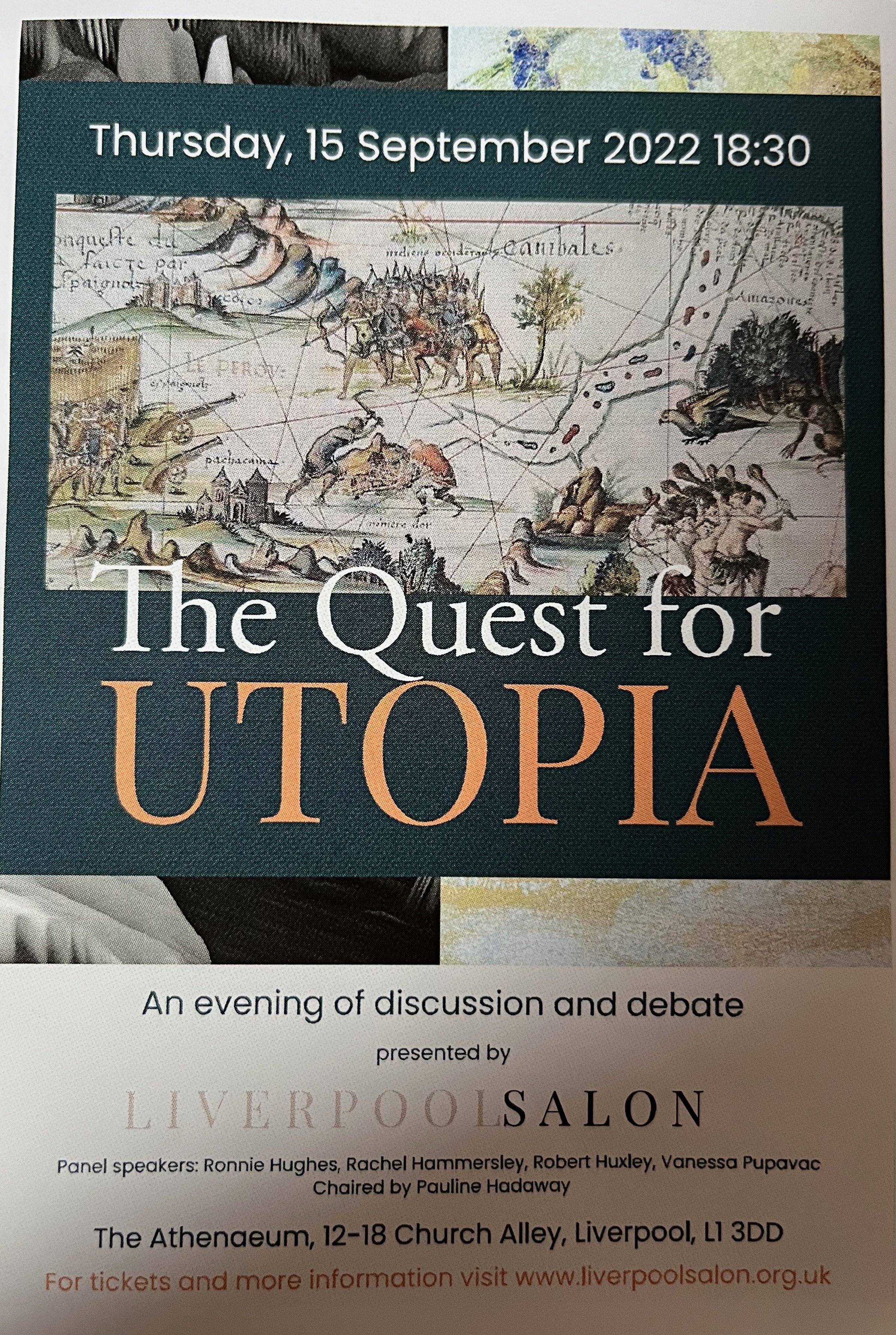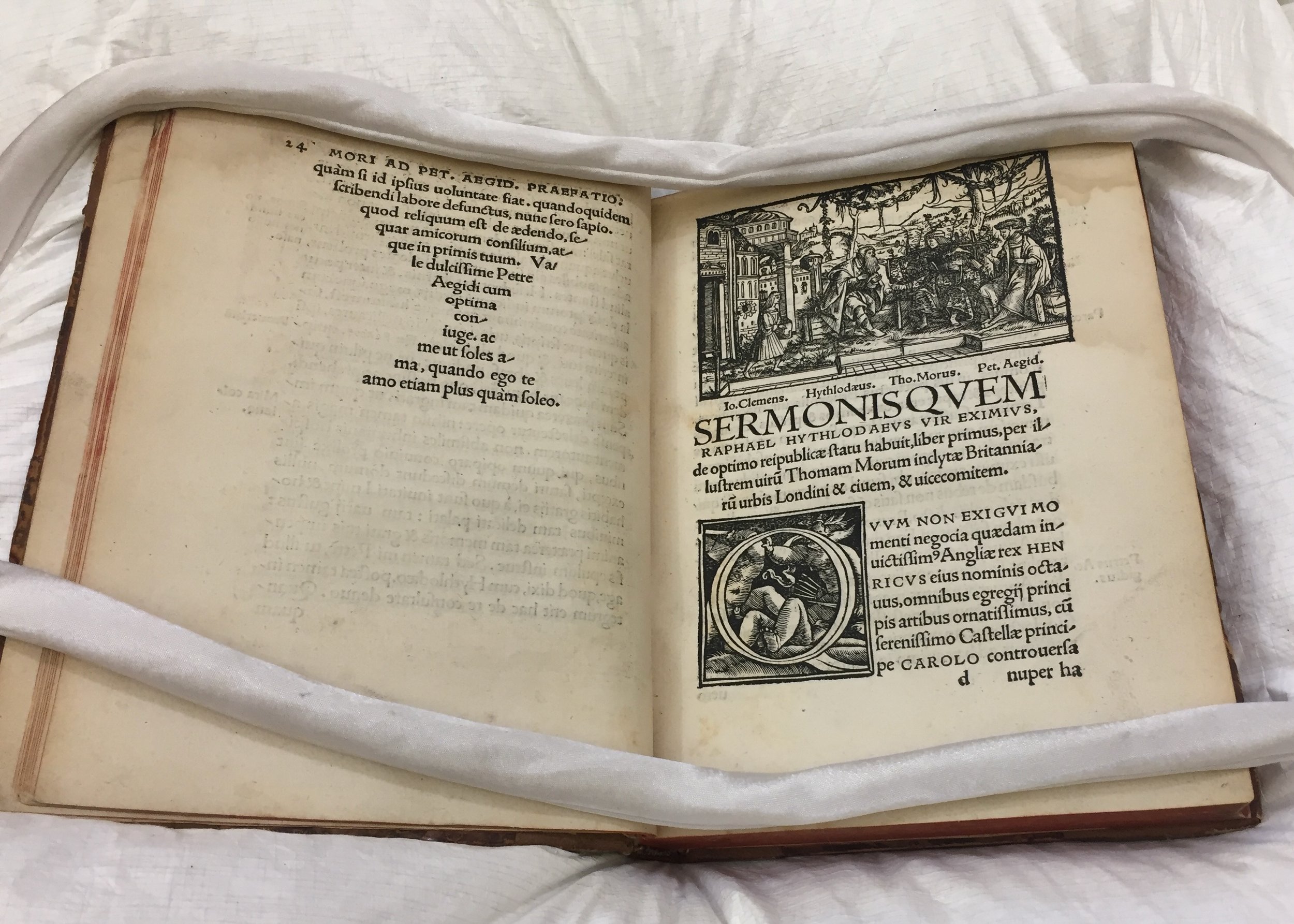In the last few weeks I have engaged in two public-facing events in which I have shared my research with non-academic audiences. Participants at both raised interesting questions and comments prompting me to think more deeply about the topics I am currently researching. In this blog I reflect on what I have learned from this engagement.
The first event was 'The Quest for Utopia', organised by the Liverpool Salon and held at the wonderful Athenaeum in Liverpool's City Centre. The Salon has been hosting public conversations on philosophical, political, and cultural topics on Merseyside for more than seven years, providing valuable opportunities for 'critical discussion'. The event in which I participated (a recording of which can be accessed here) was the first of a series exploring the theme of utopia. In his opening talk Ronnie Hughes, who presents himself as 'an occasional and formerly enthusiastic utopian practitioner', raised the provocation that the term 'utopia' has been misunderstood ever since it was first coined by Thomas More in 1516. More's aim, Ronnie insisted, had not been to create a 'perfect' society, but merely a 'better' one. I developed this point in my own introduction on James Harrington's The Commonwealth of Oceana, emphasising that when thinking about improving society we need to follow Harrington in taking human beings as they are rather than proposing plans that require super-human virtue or self-sacrifice. Moreover, given the constant dynamism of human life, deliberately leaving some things for future generations to work on (as Ronnie and his team did with the Granby Four Streets project) provides hope and opportunity for the future.
The Reading Room at the Liverpool Athenaeum. Image by Rachel Hammersley.
The emphasis on perfectionism may be one reason why, as participants lamented, utopianism is in short supply today. In our discussion we spent some time thinking about how to rekindle utopianism in the present and future. One obstacle is undoubtedly a pessimistic tendency - 'doom and gloom' as one person put it. It is easy to get so caught up in complaining about how bad things are, that we talk ourselves out of being able to do anything about it. Here too Ronnie had some wise words for us, identifying as a 'utopian moment' the point in his discussions with the Granby Four Streets residents when he told them they could have five more minutes of moaning, but then had to start talking positively about what they wanted. That shift is crucial if we are to have any hope of making things better. I was not the only participant reminded of Gerrard Winstanley and his comment that 'action is the life of all, and if thou dost not act, thou dost nothing' (Gerrard Winstanley, A Watch-Word to the City of London and the Armie, London, 1649). The first key to moving forward, then, is to turn from the negative to the positive; and to take action to move from how things have been, to how they could be.
Another important point that arose from our discussions was that scale is crucial. Grand visions can be impressive and inspiring, but they are also difficult to implement, and it can be hard to know where to start. Perhaps, then, instead of thinking big we need to take smaller steps initially to bring about concrete change. This might mean working locally rather than nationally or internationally. The Granby Four Streets project was local, as were the town projects arising out of the Garden City movement of the twentieth century. Such projects might not change the world fundamentally or bring about perfection, but they can and do make a difference to people's lives. Growing up in Milton Keynes, I was conscious that despite it often being the butt of jokes, there were many positive features of my home town (such as an extensive and well-lit cycle network) which I have missed in other places I have lived. Moreover, even small projects can have a big impact. After all, the Granby Four Streets project won the Turner Prize in 2015.
The Liverpool Athenaeum’s copy of Thomas More’s Utopia. Image by Rachel Hammersley and courtesy of the Library of the Liverpool Athenaeum - with particular thanks to Robert Huxley.
This leads to my third point: the importance of utopian thinking being grounded in place. The etymology of utopia means 'no place' and, as Robert Huxley demonstrated in his talk, a lot of utopian thinking of the Renaissance and early modern period was inspired by voyages of exploration that brought Europeans into contact with previously unknown places. But Vanessa Pupavac emphasised in her introduction that utopias work best when they are 'some place' connected to an actual location and its history. Believing, as some early explorers did, that we can impose our utopia or 'civilisation' on others - or, conversely, that we can import the Tahitian dream back to Europe - is a misconception that has repeatedly resulted in misery and disaster. We cannot remake the world divorced from the realities of climate, geography, culture, or human nature. Our utopias, then, must not only be positive and realistic, but also grounded in a particular time and place.
These ideas about how to build a better future remained in my mind as I approached the first meeting of our Experiencing Political Texts reading group, which took place at another wonderful city institution, Newcastle's Literary and Philosophical Society. The aim of this group is to explore the dissemination of political information both today and in the seventeenth and eighteenth centuries, thinking in particular about how the medium through which political ideas are conveyed can frame, influence - and even distort - the message.
Infographic advertising the Experiencing Political Texts reading group. With thanks to Nifty Fox Creative for the design.
At our initial meeting we talked about where each of us gets our knowledge about politics and current affairs from. There were various responses ranging from traditional media such as print newspapers and journals through to social media such as Twitter. It was also clear that while some of us favour text-based material, others prefer aural forms such as radio and podcasts. Fewer of us seemed to prioritise visual media, but that is also a format that is increasing in popularity - especially among the young.
Participants also commented on the limitations of some of these formats. In social media, headlines are accentuated, yet these do not always provide an accurate indication of the content of the article. Even longer articles may not provide as much depth - particularly on the history behind events - as might be necessary to properly understand them. Social media have been criticised for creating echo chambers, but participants also questioned the extent to which individuals reading conventional media seek out views and opinions different from their own.
This image and the one below are infographics produced by Nifty Fox Creative during the live scribing of our first reading group meeting.
More broadly, participants identified two pressing issues. First, the increasingly blurred line between truth and fiction - which becomes especially worrying when it is applied to the outcome of elections, as has been the case in several countries recently. Secondly, the fact that in many quarters the presentation of the news seems to be aimed primarily at entertaining the audience rather than informing or educating them. I share these concerns, but it also struck me that some of the early modern figures I have been studying actively deployed such tactics in order to engage readers. For example, Henry Neville deliberately presented his political views in entertaining genres such as a travel narrative and dialogue, and he used satire to draw in his audience. He also deliberately blurred the line between truth and fiction in order to prompt his readers into thinking more deeply about the truth of the information being presented to them. There is clearly a complexity here that requires careful unpicking.
Finally, we looked at some examples of seventeenth- and eighteenth-century political texts and compared them with the sources of political information available to us today. The group discussed what sort of people would have been able to read these works, thinking about access, class, and literacy. We acknowledged that the sharing of texts - for example by reading them aloud, passing them on to friends, and using the circulating and subscription libraries that emerged in the eighteenth century - will have increased the number of people who could engage with them. The presentation of works will also have been affected by the authors' sense of their target audiences - including the fact that some works will have been designed to be read aloud in coffee houses. The group also raised the thought-provoking question of whether authors thought only about contemporary audiences or whether they also had future readers in mind. If not, what does that mean for reading groups like ours addressing these texts today? I look forward to exploring these issues further in later sessions.






